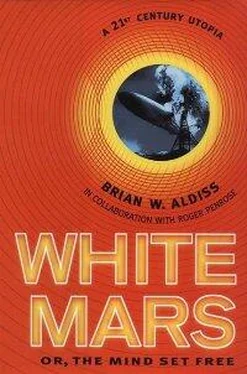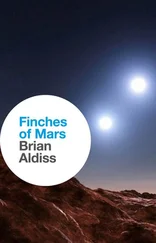Brian Aldiss - White Mars
Здесь есть возможность читать онлайн «Brian Aldiss - White Mars» весь текст электронной книги совершенно бесплатно (целиком полную версию без сокращений). В некоторых случаях можно слушать аудио, скачать через торрент в формате fb2 и присутствует краткое содержание. Год выпуска: 1999, ISBN: 1999, Издательство: Little, Brown UK, Жанр: Фантастика и фэнтези, на английском языке. Описание произведения, (предисловие) а так же отзывы посетителей доступны на портале библиотеки ЛибКат.
- Название:White Mars
- Автор:
- Издательство:Little, Brown UK
- Жанр:
- Год:1999
- ISBN:0-316-85243-0
- Рейтинг книги:5 / 5. Голосов: 1
-
Избранное:Добавить в избранное
- Отзывы:
-
Ваша оценка:
- 100
- 1
- 2
- 3
- 4
- 5
White Mars: краткое содержание, описание и аннотация
Предлагаем к чтению аннотацию, описание, краткое содержание или предисловие (зависит от того, что написал сам автор книги «White Mars»). Если вы не нашли необходимую информацию о книге — напишите в комментариях, мы постараемся отыскать её.
White Mars — читать онлайн бесплатно полную книгу (весь текст) целиком
Ниже представлен текст книги, разбитый по страницам. Система сохранения места последней прочитанной страницы, позволяет с удобством читать онлайн бесплатно книгу «White Mars», без необходимости каждый раз заново искать на чём Вы остановились. Поставьте закладку, и сможете в любой момент перейти на страницу, на которой закончили чтение.
Интервал:
Закладка:
“We’ll discuss that question when a Smudge has been identified,” I said.
“Smudge interception is vastly more likely than Utopia,” Bondi said, sharply. I thought it wiser not to answer, and continued with my list.
“We come next to Transcendics. I use the term rather loosely, not in the Kantian sense, but to mean the transcendence of humanity over everything else on the globe. Perhaps anthropocentrism would be a better word. Despite the growth of geophysiology, people by and large value things only as they are useful for human purposes. The rhinoceros, to take an obvious example, was hunted to extinction within the last forty years, simply because its horn was valued as an aphrodisiac. This splendid creature was killed off for an erroneous notion.
“But more widely we still use our seas as cesspits and our globe as a doormat. We take and take and consume and consume. We have a belief that we are able to adapt to any adverse change, and can survive and triumph, in spite of all the diseases that rage among us—in many cases diseases we have provoked through our ruination of the balance of nature. For instance when that vegetarian grazing animal, the cow, was fed meat and offal, bovine spongiform encephalitis infected herds and spread to the perpetrators of the crime.
“The myth of man’s superiority over all other forms of life is, I’m bound to say, propagated by the Judaic and Christian religions. The truth is that the globe would thrive without human beings. If our kind was wiped from the earth, it would heal over in no time and it would be as if we had never been…”
At this point, reflection on the miseries we had created for ourselves on the beautiful terrestrial globe overcame me. I cried aloud in protest at my own words, knowing in my heart that, though we must make the best of our opportunities on Mars, Mars would never be the lovely place that Earth was, or had been.
Perhaps I should interrupt my narrative here to say that the hall in which we held our public discussions was dominated by a blow-up of one of the most extraordinary photographs of the Technological Age. Towering over us in black and white was a shot taken in 1937 of an enormous firework display. When the Nazi airship the Hindenburg was about to attach itself to a mooring mast, having flown across the Atlantic to the United States, its hydrogen tanks exploded and the great zeppelin burst into flame.
That beautiful, terrifying picture, of the gigantic structure sinking to the ground, may seem like the wrong signal to those who had crossed a far greater distance of space than had the ill-fated airship. Yet it held inspiration. It showed the fallibility of man’s technological schemes and reminded us of evil nationalist aspirations while remaining a grand Promethean image. We spoke under this magnificent Janus-faced symbol.
But, for a moment, I was unable to speak.
Seeing my distress, Hal Kissorian, a statistical demographer and one of the stranded YEAs, spoke up cheerfully.
“We all have complaints against our mother planet, Tom, much though we love it. But we have to learn things anew, to suit our new circumstances here. Do not be afraid to speak out.
“Let me offer you and all of us some comfort. I have been looking into the computer records, and have discovered that only fifteen per cent of us Martians here assembled are the first-borns in their families. The great majority of us are later-born sons and daughters.”
There was some laughter at the apparent irrelevance of this finding.
Kissorian himself laughed so that his unruly hair flopped over his brow. He was a cheerful, rather wanton-looking, young fellow. “We laugh. We are being traditional. Yet the fact is that over a great range of scientific discoveries and social upheavals which have changed mankind’s view of itself, the effects of familial birth order have played their part.”
At calls for examples, Kissorian instanced Copernicus, William Harvey, discoverer of the circulation of the blood, William Godwin with An Enquiry Concerning Political Justice, Florence Nightingale, The Lady with the Lamp’, the great Charles Darwin, Alfred Wallace, Marx, Lenin, Dreiser Hawkwood, and many others, all later-born progeny.
A DOP I recognised as John Homer Bateson, the retired principal of an American university, agreed. “Francis Bacon, Lord Verulam, makes more or less the same point,” he said, leaning forward and clutching the chair back in front of him with a skeletal hand, “in one of his essays or counsels. He says that, among children, the eldest are respected and the youngest become wantons. That’s the term he uses—wantons! But in between are offspring who are pretty well neglected, and they prove themselves to be the best of the bunch.”
This observation was delivered with such majesty that it incurred a number of boos.
Whereupon the retired principal remarked that dumbing-down had already settled itself on Mars.
“Anything can be proved by statistics,” someone called to Kissorian.
“My claim will demonstrate its validity here by our general contrary traits and our wish to change the world,” Kissorian replied, unperturbed.
“Our wish is to unite and change this small world,” I rejoined, and went on with my catalogue of the five partially concealed causes of global unhappiness.
“Our preconceived concept of mankind as master of all things prevents us from establishing sound institutions—institutions that might serve to provide worldwide restraints against the sort of depredations of which we have talked. Were it not for our anthropocentrism, we would long ago have established a law, observed by all, against the pollution of the oceans, the desecration of the land, and the destruction of the ozone layer.
“The myth that we can do anything with anything we like causes much misery, from the upsetting of climates onwards. As you all know, had we acted under that mistaken belief, Mars would now be flooded with CFC gases in an attempt to terraform it, had it not been for a good man as General Secretary of the UN and his few far-sighted supporters.
“Transcendics I regard as embodying something destructive in the character of mankind. For instance, the lust to obliterate old things, from buildings to traditions, which make for stability and contentment. Terraforming is just one instance of that intention. Yet new things have no rich meaning for us unless they can be seen to develop from the old. Existence should be a continuity.
“While I am no believer, I see the role of the Church—and its architecture—in communities as a stabilising, unifying factor. Yet from within the Church itself has emerged a retranslation of Bible and prayer into so-called plain language—a dumbing-down that destroys the old sense of mystery, reverence and tradition. We need those elements. Their loss brings a further challenge to family life.”
“Forget family life!” came a voice.
“Yeah, let’s forget oxygen,” came a speedy rejoinder from my new supporter, Beau Stephens.
For some minutes an argument raged about the value of family life. I said nothing; I did not entirely know where I stood on the question; mine had been a strange upbringing. I held what I considered an old-fashioned view: that at the centre of “family life” was the woman who must bring forth a new generation, and both she and her children needed such protection as a male could give. Undoubtedly, the time would come when the womb was superseded. Then, I supposed, family life would fade away, would become a thing of the past.
After a while, I called for order and returned to my list of discontents.
“Let’s move on to the third stumbling block to contentment, Market Domination—another little item we have escaped here on Mars. We have all felt, since we came here, the relief of having no traffic with money. It feels strange at first, doesn’t it?
Читать дальшеИнтервал:
Закладка:
Похожие книги на «White Mars»
Представляем Вашему вниманию похожие книги на «White Mars» списком для выбора. Мы отобрали схожую по названию и смыслу литературу в надежде предоставить читателям больше вариантов отыскать новые, интересные, ещё непрочитанные произведения.
Обсуждение, отзывы о книге «White Mars» и просто собственные мнения читателей. Оставьте ваши комментарии, напишите, что Вы думаете о произведении, его смысле или главных героях. Укажите что конкретно понравилось, а что нет, и почему Вы так считаете.










